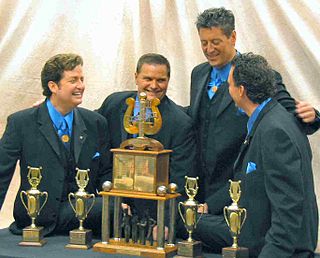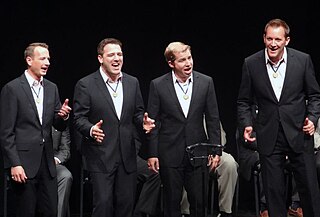A cappella music is group or solo singing without instrumental accompaniment, or a piece intended to be performed in this way. The term "a cappella" was originally intended to differentiate between Renaissance polyphony and Baroque concertato style. In the 19th century, a renewed interest in Renaissance polyphony coupled with an ignorance of the fact that vocal parts were often doubled by instrumentalists led to the term coming to mean unaccompanied vocal music. The term is also used, albeit rarely, as a synonym for alla breve.
Misfits or The Misfits may refer to:

A barbershop quartet is a group of four singers who sing music in the barbershop genre of singing, which uses four-part harmony without accompaniment by instruments, a style called a cappella. It consists of a lead, the vocal part which generally carries the tune/melody; a bass, the part which provides the bass line to the melody; a tenor, the part which harmonizes above the lead; and a baritone, the part that completes the chord with the note not being sung by the lead, bass, or tenor singers. The baritone can sing either above or below the lead singer.

The Barbershop Harmony Society, legally and historically named the Society for the Preservation and Encouragement of Barber Shop Quartet Singing in America, Inc. (SPEBSQSA), is the first of several organizations to promote and preserve barbershop music as an art form. Founded by Owen C. Cash and Rupert I. Hall in Tulsa, Oklahoma in 1938, the organization quickly grew, promoting barbershop harmony among men of all ages. As of 2014, just under 23,000 men in the United States and Canada were members of this organization whose focus is on a cappella music. The international headquarters was in Kenosha, Wisconsin for fifty years before moving to Nashville, Tennessee in 2007. In June 2018, the society announced it would allow women to join as full members.

Barbershop vocal harmony, as codified during the barbershop revival era (1930s–present), is a style of a cappella close harmony, or unaccompanied vocal music, characterized by consonant four-part chords for every melody note in a predominantly homophonic texture. Each of the four parts has its own role: generally, the lead sings the melody, the tenor harmonizes above the melody, the bass sings the lowest harmonizing notes, and the baritone completes the chord, usually below the lead. The melody is not usually sung by the tenor or baritone, except for an infrequent note or two to avoid awkward voice leading, in tags or codas, or when some appropriate embellishment can be created. One characteristic feature of barbershop harmony is the use of what is known as "snakes" and "swipes". This is when a chord is altered by a change in one or more non-melodic voices. Occasional passages may be sung by fewer than four voice parts.

Vocal Majority (VM) is a Dallas, Texas-based men's chorus of over 150 singers, who bill themselves with the tagline "Pure Harmony." VM is the performing chorus of the Dallas Metro chapter of the Barbershop Harmony Society (BHS). Vocal Majority has won thirteen International Chorus Championships, a Barbershop Harmony Society record. The first eleven gold medals were earned under the direction of Jim Clancy, who retired from International competition after 2010. The most recent championships, in 2014 and 2018, came under the direction of Jim's son Greg Clancy, the current Musical Director of VM.
Michigan Jake was a barbershop quartet that formed in 1995. The quartet borrowed the name from Michigan J. Frog, the singing frog in the 1955 Merrie Melodies short One Froggy Evening. The original line-up comprised the section leaders of the Louisville Times chorus of Louisville, Kentucky. After a few changes in the line-up, Michigan Jake won the 2001 International Quartet Contest in Nashville. They announced their retirement on July 1, 2004.
Vocal Spectrum is a barbershop quartet from St. Charles, Missouri. In 2004, Vocal Spectrum won the Barbershop Harmony Society's International Collegiate Quartet Contest, and on July 8, 2006, they became International Champions, winning the society's International Quartet Contest. A distinctive factor of the quartet is tenor Tim Waurick's ability to sustain notes for upwards of 30 seconds, and the tenor's and lead's incredibly high note range, featured in many of the group's recordings and live shows.

Max Q is the barbershop quartet that won the gold medal Barbershop Harmony Society International Barbershop Quartet Contest at Denver's Pepsi Center July 7, 2007. The quartet's run for the title is featured in the 2009 feature documentary American Harmony.
GNU is a Unix-like computer operating system developed by the GNU Project.

OC Times is a male barbershop quartet affiliated with the Barbershop Harmony Society. They earned second place silver medals at the International Barbershop Quartet Contest at Denver's Pepsi Center on July 7, 2007, and won the International Quartet Championship on July 5, 2008, in Nashville, Tennessee. The quartet combines traditional barbershop harmonies with contemporary music styles. The music of OC Times is inspired by artists like Michael Buble, Sinatra, and Elvis.
Mainliner or Mainliners may refer to:
Big O or The Big O may refer to:

Hallmark of Harmony is the male barbershop chorus of the Sheffield Barbershop Harmony Club, based in Sheffield, England. The chorus formed in 1978 and has won the British Association of Barbershop Singers (BABS) gold medal eight times, in 1986, 1989, 1991, 1994, 1997, 2000, 2014 and 2019. It won the silver medal in 1983, 1984, 1988, 1993, 1996, 1999 and 2013 & bronze in 1985 and 2012.
Tim Waurick is a barbershop tenor singer, and coach for various barbershop choruses and quartets. Waurick creates learning tracks – recordings in which one part is dominant and the others are sung softly in the background – for the Barbershop Harmony Society, Sweet Adelines International, and various other quartets and choruses around the world. His learning track company is named TimTracks.
The results of the Sweet Adelines International competition for choruses in the years 2010–2019 are as follows.








